Home » Projects » Small Projects » Voices of Late Imperial Chinese Woman: Literature, Life, and Legacy
Category Archives: Voices of Late Imperial Chinese Woman: Literature, Life, and Legacy
Student Report on Having it All: Understanding Work & Family Dynamics in Contemporary Korea

By Nathan Franco, Class of 2028.
On Monday, April 15th, 2025, two DKU faculty and 32 students gathered in person or via Zoom for a discussion on Work and Family Dynamics in Contemporary Korea, a research paper conducted by Hyeyoung Woo, a Professor of Sociology at Portland State University, in collaboration with colleagues from Seoul University, Pennsylvania University, among other Universities. The research aimed to determine the gap in health in age groups 18-29, 30-49, and 50-65 (working age) considering three factors: education, employment, and family formations. The research question is, does the association between gender and Self-Reported Health (SRH) vary across Korea, the United States, and Finland? The discussion began with background information.
Professor Woo first explains Korea’s educational background: Tertiary education is beyond secondary education. Overall, there has been an increasing trend in education in Korea over time. Professor Woo then showed a graph that showed education attainment in Korea going from 20% to 70%. In addition, Professor Woo shared that from the 1970s to 2020, the employment trend of men and women increased. But when you look at the rate of married males and females, women fall short compared to men. However, the increase of unmarried individuals in 2020 is almost equal among males and females. Globally, Korea also “excels” in the gender wage gap, which the OECD graph shows is about 30%, which means women make 70% less than employed males. Furthermore, Korea’s total fertility rate is below 1, which means that Korean females are expected to have less than one child. The size of the population over time will, therefore, continuously shrink. A low total fertility rate isn’t unique to Korea, but Korea is the only country below 1 in fertility rate. That said, when Koreans have children, they tend to put a lot of work into that child (expenditure on private education and more).
After conducting her research, Professor Woo made the following findings:
- In Korea, the highest gender gap in SRH is observed, especially among young and middle-aged Koreans.
- Women in the United States also experience a health disadvantage relative to men. However, this disadvantage in the United States is smaller than the disadvantage in Korea, and covariates, including family formation and employment, explain the disadvantage among middle-aged and older American women.
- In Finland, the health disadvantage among women is only observed among young adults, and in fact, among middle-aged and older adults, women tend to have higher levels of health than men do.
Professor Woo concluded that gender differences in health are highly contingent on an individual’s social location within a specific country and cross-national variations in work cultures, family practices, and work-family policy.
However, after conducting her research, Professor Woo felt that another round of research, specifically on Korea, was needed. Her summary of her findings is as follows.
Most young adults in Korea tend to work first and have a family later, or work without a family. A conclusion from the findings is that both employed men and women that marry later in their life and remain married, in addition to having children tends to lead to the best health outcomes. On the other hand, those with limited employment and negligible family formation pathways appear to be the most vulnerable. However, despite high work-family incompatibility and the rise of being single and childless in recent years, both work and family are still protective for health. For men, marriage and children provide additional health advantages beyond employment.

Lastly, we wrapped up with a short Q&A.
Q&A:
Q: This research is wide in scope; how can we explore the causal relationship (social factors and health outcomes) between the factors in Korea?
A: This is a challenging problem in the social sciences. There is a tendency that when you have a higher education, you will also make a greater amount of money, but this isn’t necessarily causation. When considering current health outcomes, we consider the past because we know that education comes first. So, health isn’t going to cause education, but rather, education may be a cause of health.
Beyond the Birthing Chamber: Alternative Public Services of Midwives in the Ming and Qing Dynasties
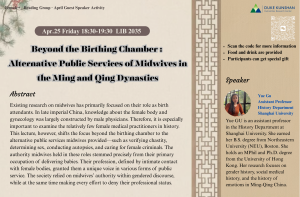
Date: April 25, Friday
Time:6:30-7:30 pm
Location: LIB 2001
Speaker:
Yue GU is an assistant professor in the History Department at Shanghai University. She earned her B.S. degree from Northeastern University (NEU), Boston. She holds an MPhil and Ph.D. degree from the University of Hong Kong. Her research focuses on gender history, social medical history, and the history of emotions in Ming-Qing China.
Abstract:
Existing research on midwives has primarily focused on their role as birth attendants. In late imperial China, knowledge about the female body and gynecology was largely constructed by male physicians. Therefore, it is especially important to examine the relatively few female medical practitioners in history. This lecture, however, shifts the focus beyond the birthing chamber to the alternative public services midwives provided—such as verifying chastity, determining sex, conducting autopsies, and caring for female criminals. The authority midwives held in these roles stemmed precisely from their primary occupation of delivering babies. Their profession, defined by intimate contact with female bodies, granted them a unique voice in various forms of public service. The society relied on midwives’ authority within gendered discourse, while at the same time making every effort to deny their professional status.
Student Report: Gambling and Early Modern Vernacular Stories: 馮夢龍 (1574-1646) and Li Yu 李漁 (1611-1680)
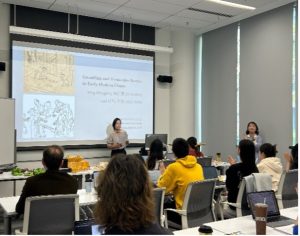
Reported by Yuqing Wang, Class of 2025
On April 16th, Duke Kunshan University had the pleasure of hosting Professor Jiayi Chen from Washington University in St. Louis for a lecture titled Gambling and Early Modern Vernacular Stories: Feng Menglong and Li Yu. Held in CCT E1012, the event attracted around 30 students and faculty members from various disciplines, creating a lively and engaged atmosphere.
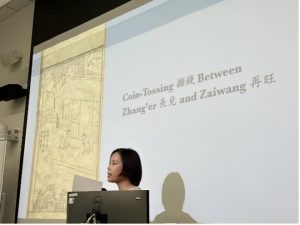
Professor Jiayi Chen focused on two vernacular short stories—“A Trifling Quarrel Over a Penny Leads to an Extraordinary Tragedy” by Feng Menglong and “A Living Person Pays the Gambling Debt for a Ghost” by Li Yu—to explore how gambling functions as a key narrative device. She argued that in the literary context of late Ming and early Qing China, gambling was more than a recreational activity—it became a symbolic structure through which writers explored moral tension, social risk, and the unpredictability of fate. Following the format of simple coin-flipping gamble, a single wager in these stories could lead to dramatic consequences, prompting deeper reflection on opportunity and agency while refraining from giving clear moral teachings.
In addition to textual analysis, Professor Chen introduced various forms of gambling practiced in premodern China, such as dice games, treasure guessing, and betting rituals. These historical examples helped bridge the gap between literary imagination and lived cultural practices, enriching the audience’s understanding of both.
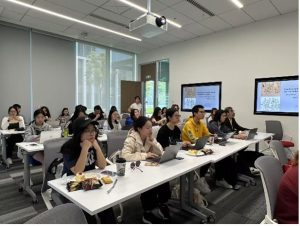
The Q&A session was dynamic and intellectually stimulating. Students raised thoughtful questions about narrative structure, gender representation, and symbolic meaning. Many commented that the lecture helped them see early vernacular fiction—and the role of “games” in literature—in a completely new light. Overall, the lecture offered a nuanced and engaging perspective on how literature and cultural practice intersect, highlighting the complexity and richness of early Chinese storytelling.
Event Report — Female Pain in Pre-modern China/ Reading group night
By Yuqing Wang, Class of 2025 & Yuting Zeng, Class of 2026
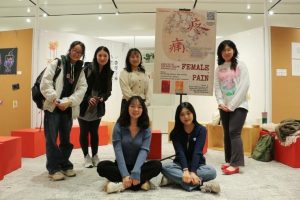
February 21, 2025, Professor Wenting Ji, Yuqing Wang and Yuting Zeng hosted a reading group sharing event centered on the theme of “female+pain,” guided by historian Dorothy Ko’s two monographs on women in Chinese history: Cinderella’s Sisters and Teachers in the Inner Chambers. This session attracts more than fifteen participants, including students and faculty members.
The event began with Yuting distributing handouts to initiate our discussion, setting the stage for an engaging conversation. Participants first reflected on pain as a personal and historical experience, questioning whether it can serve as a voice when words fail. This led to a nuanced discussion on footbinding, moving beyond its traditional portrayal as a symbol of oppression to examine its complex roles in cultural identity, social status, and gendered expectations. Yuqing then shifted the discussion to women’s education in premodern China, highlighting its dual nature as both a privilege and a tool of control. Professor Ji provided valuable insights into the gendered limitations of learning, from home-based instruction to moral conditioning. Participants engaged in a debate on whether education fosters liberation or reinforces confinement, drawing connections to modern-day gender norms.
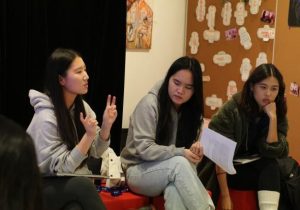 Our conversation expanded beyond historical analysis to address the multifaceted forms of pain experienced by women, past and present. Topics ranged from menstrual pain and its associated social stigma to the systematic exclusion of women from intellectual spaces. Participants drew parallels between historical silences and modern struggles for visibility and voice, prompting a deeper reflection on the enduring impact of pain—whether physical, social, or intellectual—on women’s lives.
Our conversation expanded beyond historical analysis to address the multifaceted forms of pain experienced by women, past and present. Topics ranged from menstrual pain and its associated social stigma to the systematic exclusion of women from intellectual spaces. Participants drew parallels between historical silences and modern struggles for visibility and voice, prompting a deeper reflection on the enduring impact of pain—whether physical, social, or intellectual—on women’s lives.
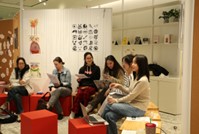
By the end of the session, participants left with a deeper understanding of the complexities surrounding women’s pain, both in historical contexts and contemporary society. The discussion fostered a critical examination of how pain has been used to define, constrain, and sometimes empower women, highlighting its role in shaping gendered experiences over time. Through engaged dialogue, attendees reflected on the evolving significance of footbinding, education, and exclusion, drawing connections between past struggles and present-day realities. The event not only encouraged meaningful scholarly exchange but also inspired participants to continue exploring these themes in their own research and daily lives.
Teng Tong 疼痛: Female + Pain Reading Group
 Date: 2/20 (Thursday) 6:30-7:30 pm
Date: 2/20 (Thursday) 6:30-7:30 pm
Location: AB1075A(HUM Space)
Introduction:
Pain, both physical and psychological, is one of the most complex emotions and experiences. In late imperial China (17th to 19th century), shaped by cultural and historical contexts such as Confucian hierarchy and the practice of footbinding, women experienced pain in ways distinct from their male counterparts and from contemporary understandings. This created a unique discourse around gender, the body, and historical conditions. In this reading event, we will begin by exploring two books by historian Dorothy Ko: Teachers of the Inner Chambers: Women and Culture in Seventeenth-Century China and Cinderella’s Sisters: A Revisionist History of Footbinding. Following the reading, we will open up a discussion on the intersection of female experience, pain, and the gendered body.
All are welcome. Pizza and refreshments will be provided on-site. Scan the QR code to join the group and stay updated on future events.